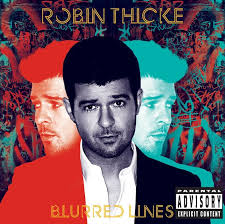by Kalpanaa Misra
Attachment to the age-old misogynist belief that men have rights over women’s bodies could be what’s behind Robin Thicke’s lyrics of his summer hit Blurred Lines. The song is hugely popular perhaps because of the shock value inherent in the nudity (of women of course) in the uncensored version of the song. The chorus reiterates, with sickening regularity and tinny insistence, “I know you want it” – referring to sex, with the implication that a woman saying “no” to sex is just a part of the courtship game. Bollywood is an ongoing offender in this category with the latest offering being Ranjhaana, which is hardly the cute love story it has been portrayed as and more a reiteration of the belief that stalking a girl who says ”no” is normal and a rite of passage before the hero wins the the heroine.
Blurred Lines goes on to call the woman a “good girl,” implying that she’s just acting coy when she says no. It’s an ancient mindset that Thicke seems to have difficulty shaking off. He would do well to realize that “No means no” and that women know their minds.
The crass “compliments” continue: “You the hottest bitch in this place. I feel so lucky…” – if a woman looks hot, or converses with you, it doesn’t follow automatically that she wants to have sex with you. You don’t have to read between the “Blurred Lines” and come up with your own interpretation based on your attachment to sexist ideals.
The song gets more and more graphic with lines to the tune of “Do it like it hurt…” Indeed! Is this the male fantasy of what women want from a sexual encounter? Pain? It gets worse. (Graphic alert: some people may be offended by the following lines) “I’ll give you something to tear your ass in two,” a casual reference to non-consensual anal sex, apparently a wonderful way for a man to show a woman who is in charge. Absolutely delightful!
Thicke responds to the outrage this song has unleashed in a manner true to his name, “What a pleasure it is to degrade a woman,” he joked, using the argument that since he’s happily married he has to be the perfect person to use his art to get people talking about consensual sex. I don’t know. I think the song came first and the clever argument about how it’s politically correct came later. What’s worse is that there are far too many men out there attached to the thoughts the song voices. They don’t see Blurred Lines as an opportunity to discuss the rightness or wrongness of rape and sexual harassment but rather as an indictment of their actions. They see it as a validation of their stance.
If you watched the video, which is as boring as the song itself with its repetitive idiotic rhythm you can’t but have noticed the nudity, the objectification of the women and the sexualized positions and gestures. It’s hardly art if it reduces women to mere sex objects, and nowhere does the song indicate that it’s parodying an attitude that needs to be questioned. An attitude that violence, sexual or otherwise, against women, is the norm and is cool.
Feminists have not been quiet about this assault on women. There are a number of rejoinders to this song. One of them, Defined Lines by The Law Revue Girls, is sexy and funny and has three semi-nude men cavorting in a ridiculous fashion made popular for young girls in semi-pornographic videos and interestingly, in the style of Thicke’s video for Blurred Lines.
The lines of Defined Lines are brilliant rejoinders: “What you seen on TV doesn’t speak equality, it’s straight up misogyny”. The response to being called “good girl” – “We ain’t good girls – we are scholastic, smart and sarcastic, not fuc*ing plastic…” ending with, “Tell me how it feels to get verbally harassed.”
Another parody is by Melinda Hughes, Lame Lines which starts with the lines “Baby I can hear what you’re trying to say, dragging me back to the Stone Age. Maybe I want respect, maybe you want some sex…” is fun too. Much more fun than Blurred Lines.
Before we get to the old argument that men are attached to, that feminists don’t enjoy sex therefore the brouhaha, let me ask you – is Burred Lines about sexuality? Is it sensual in any way? Let’s lose our attachment to the need for disempowering women by telling them, “We know you want it.” That’s what rapists say to justify their actions as has been well analysed on Sociological Images in Out of the Mouths of Rapists.
When the outrage against Yo Yo Honey Singh’s Main Hoo Balatkaari got his New Year’s Eve concert cancelled after the December 16th rape, many naysayers talked about Yo Yo’s freedom of expression which the protestors had apparently violated. A man’s freedom of expression cannot be violated but a woman’s body can be violated with rape culture? Let’s not get attached to violent degrading songs sung for shock value. Let’s not believe that these lyrics are cool. Rape is never cool. Let’s not propagate rape culture by quietly accepting songs such as these.
Kalpanaa Misra is a writer. She blogs at http://kalpanawrites.blogspot.in. Her twitter handle is @kalpanapster.







Good one! I couldn’t agree more. Misogyny in any form should never be tolerated.